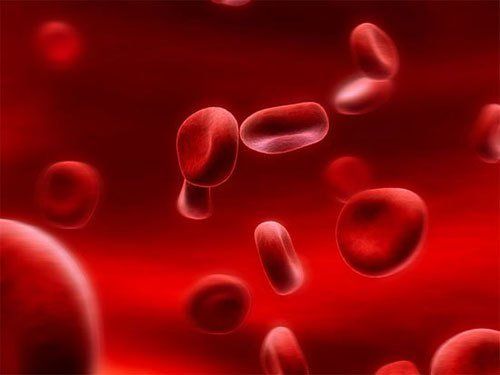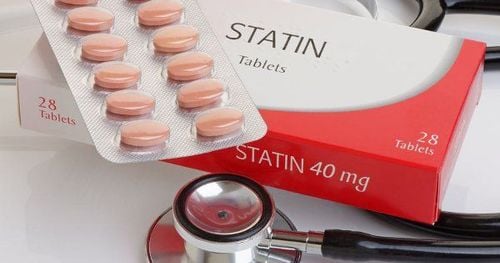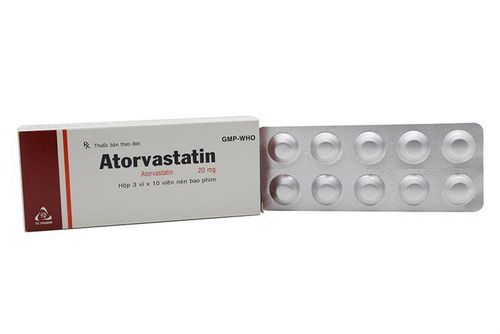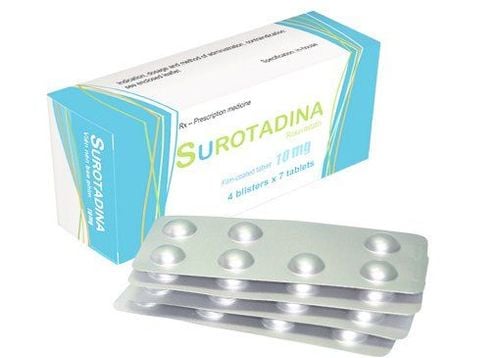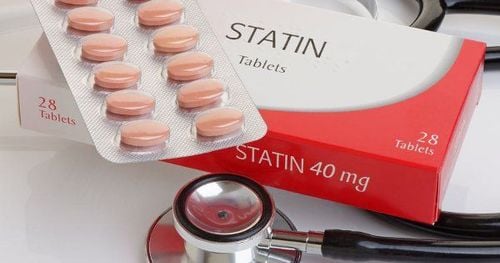This is an automatically translated article.
The article was professionally consulted with MSc Do Thi Hoang Ha - Doctor of Biochemistry, Laboratory Department - Vinmec Hai Phong International General Hospital.Blood lipid test is an essential test to help detect and promptly treat many dangerous diseases related to dyslipidemia such as coronary heart disease, myocardial infarction, cerebrovascular accident... What is a lipid blood test and who should get a blood lipid test? Find out the necessary information through the article below.
1. What are blood lipids?
Blood lipids (blood fats) are important components of the human body, including the main components cholesterol, triglycerides and phospholipids. Among them, the most important component is cholesterol. Cholesterol is the main steroid in the human body as well as a component found in all parts of the body, is the raw material for the formation of bile salts and other steroid hormones, and is also a component of cell membranes. Cholesterol is an important factor in helping the body to grow and develop normally. There are two main types of cholesterol: the bad type (LDL-Cholesterol - Low-density cholesterol) and the good type (HDL Cholesterol - High-density cholesterol).When a disorder occurs between components (mainly due to high cholesterol) causing dyslipidemia, the characteristic pathology here is atherosclerosis. It is also the cause of many dangerous diseases such as coronary artery disease, myocardial infarction, cerebrovascular accident...
Triglycerides are also a type of lipid in the body. When you eat, your body converts any calories it doesn't need to use right away into this triglyceride, which is stored in your fat cells. People with high blood triglycerides often have elevated total cholesterol (both bad and good) (combined dyslipidemia) or a small number of people will have isolated hypertriglyceridemia.
2. Who needs a blood test?
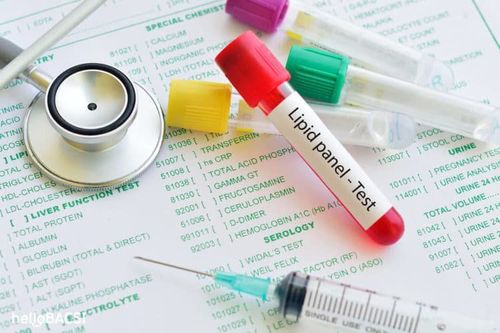
Blood lipid testing (screening for dyslipidemia) is indicated for people who:
Have clinical manifestations of cardiovascular disease, signs associated with increased cardiovascular risk. Conduct screening for dyslipidemia whenever screening for cardiovascular risk factors is required. Blood lipid testing in people with chronic autoimmune inflammatory conditions such as rheumatoid arthritis, systemic lupus erythematosus, psoriasis. Women with diabetes or high blood pressure during pregnancy are also at risk for cardiovascular disease. Smokers. Men with erectile dysfunction. People with chronic kidney disease. People with hereditary dyslipidemia with manifestations such as xanthoma, xanthelasma under 45 years old. Family members with a history of dyslipidemia are also indicated. People with peripheral artery disease or increased intima-media thickness, or carotid atherosclerosis. All adults (men over 40 years old, women over 50 years old, or after menopause) should have their blood lipids tested, especially those with risk factors for cardiovascular disease.
3. What does a blood test do?
The blood test process focuses on evaluating the parameters of the components in blood lipids (mainly cholesterol and blood triglycerides), thereby determining whether the blood lipid concentration is within the reference range or not, detecting the risks associated with diabetes. risk of diseases related to dyslipidemia and provide appropriate treatment to avoid possible complications.3.1. Indicators of blood lipid disorders
HDL-C (High Density Cholesterol - Good Cholesterol): one of the main components of blood cholesterol, is indicated along with total cholesterol and LDL-C, used to evaluate before starting treatment. Non-HDL-C (Non-HDL-C Cholesterol): as the name implies, simply subtract the amount of high-density lipoprotein (HDL, or "good") cholesterol from your total cholesterol. So it contains all the "bad" cholesterol and is analyzed to further characterize dyslipidemia in patients with diabetes, metabolic syndrome or chronic kidney disease. (Low-Density Cholesterol Lipoprotein - Bad Cholesterol): is a key component to analyze blood lipids and assess the risk of atherosclerosis as well as other cardiovascular diseases. Information about the balance between lipid intake and lipid metabolism in the body, reflecting VLDL overload or as a result of an abnormal fasting accumulation of chylomicrons, and used as an aid in the diagnosis diagnosis and treatment.3.2. Detailed evaluation of parameters in blood lipids
Below is a classification table of cholesterol and triglyceride levels (mmol/l), which is the basis for assessing whether blood lipid levels are within the reference range: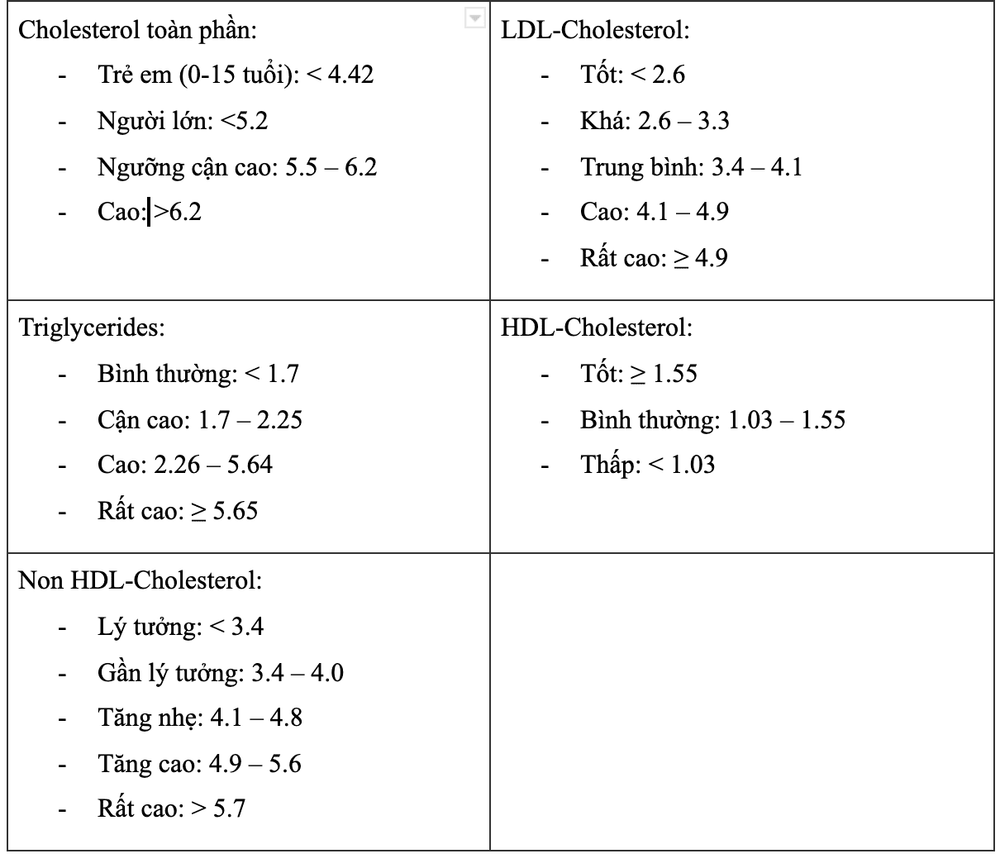
When there are signs of dyslipidemia, you need to immediately go to reputable medical facilities to conduct tests and have the most accurate diagnosis. From there, the doctor will come up with a treatment plan tailored to each individual's condition.
>> see more: Drugs to treat blood lipid disorders
Vinmec International General Hospital is one of the hospitals that not only ensures professional quality with a team of leading medical doctors, a system of public equipment modern technology, but also outstanding with comprehensive and professional medical examination, consulting and treatment services; civilized, polite, safe and sterile medical examination and treatment space. Customers when choosing to perform tests here can be completely assured of the accuracy of test results.
Please dial HOTLINE for more information or register for an appointment HERE. Download MyVinmec app to make appointments faster and to manage your bookings easily.





